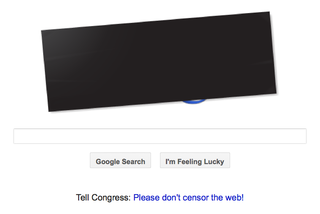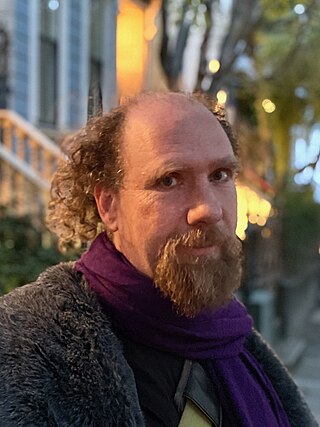Center for Democracy & Technology (CDT) is a Washington, D.C.–based 501(c)(3) nonprofit organisation that advocates for digital rights and freedom of expression. CDT seeks to promote legislation that enables individuals to use the internet for purposes of well-intent, while at the same time reducing its potential for harm. It advocates for transparency, accountability, and limiting the collection of personal information.
The Turn the Web Black protest, also called the Great Web Blackout, the Turn Your Web Pages Black protest, and Black Thursday, was a February 8–9, 1996, online activism action, led by the Voters' Telecommunications Watch and the Center for Democracy and Technology, paralleling the longer-term Blue Ribbon Online Free Speech Campaign organized by the Electronic Frontier Foundation. It protested the Communications Decency Act (CDA), a piece of rider legislation for Internet censorship attached to the Telecommunications Act of 1996, and passed by the United States Congress on February 1, 1996. Timed to coincide with President Bill Clinton's signing of the bill on February 8, 1996, a large number of web sites had their background color turned to black for 48 hours to protest the CDA's perceived curtailment of freedom of expression. Thousands of websites, including a number of major ones, joined in the protest. The campaign was noted by major media outlets such as CNN, Time magazine and The New York Times.

Aaron Hillel Swartz was an American computer programmer, entrepreneur, writer, political organizer, and Internet hacktivist. As a programmer, Swartz helped develop the web feed format RSS; the technical architecture for Creative Commons, an organization dedicated to creating copyright licenses; the website framework web.py; and Markdown, a lightweight markup language format. Swartz was involved in the development of the social news aggregation website Reddit until he departed from the company in 2007. He is often credited as a martyr and a prodigy, and his work focused on civic awareness and activism.
In the United States, internet censorship is the suppression of information published or viewed on the Internet in the United States. The First Amendment of the United States Constitution protects freedom of speech and expression against federal, state, and local government censorship.

La Quadrature du Net is a French advocacy group that promotes digital rights and freedoms for its citizens. It advocates for French and European legislation to respect the founding principles of the Internet, most notably the free circulation of knowledge. La Quadrature du Net engages in public-policy debates concerning, for instance, freedom of speech, copyright, regulation of telecommunications and online privacy.

United States Senate Bill S.3804, known as the Combating Online Infringement and Counterfeits Act (COICA) was a bill introduced by Senator Patrick Leahy (D-VT) on September 20, 2010. It proposed amendments to Chapter 113 of Title 18 of the United States Code that would authorize the Attorney General to bring an in rem action against any domain name found "dedicated to infringing activities," as defined within the text of the bill. Upon bringing such an action, and obtaining an order for relief, the registrar of, or registry affiliated with, the infringing domain would be compelled to "suspend operation of and lock the domain name."

The PROTECT IP Act was a proposed law with the stated goal of giving the US government and copyright holders additional tools to curb access to "rogue websites dedicated to the sale of infringing or counterfeit goods", especially those registered outside the U.S. The bill was introduced on May 12, 2011, by Senator Patrick Leahy (D-VT) and 11 bipartisan co-sponsors. The Congressional Budget Office estimated that implementation of the bill would cost the federal government $47 million through 2016, to cover enforcement costs and the hiring and training of 22 new special agents and 26 support staff. The Senate Judiciary Committee passed the bill, but Senator Ron Wyden (D-OR) placed a hold on it.

The Stop Online Piracy Act (SOPA) was a proposed United States congressional bill to expand the ability of U.S. law enforcement to combat online copyright infringement and online trafficking in counterfeit goods. Introduced on October 26, 2011, by Representative Lamar Smith (R-TX), provisions included the requesting of court orders to bar advertising networks and payment facilities from conducting business with infringing websites, and search engines from linking to the websites, and court orders requiring Internet service providers to block access to the websites. The proposed law would have expanded existing criminal laws to include unauthorized streaming of copyrighted content, imposing a maximum penalty of five years in prison.

The Online Protection and Enforcement of Digital Trade Act is a bill introduced in the United States Congress proposed as an alternative to the Stop Online Piracy Act and PROTECT IP Act, by Senator Ron Wyden of Oregon, a Democrat, and Representative Darrell Issa of California, a Republican. The text of the bill is available for public comment at keepthewebopen.com.
There were different but similar copyright bills in the 112th United States Congress: The Stop Online Piracy Act (SOPA) in the House of Representatives and the PROTECT IP Act (PIPA) in the Senate. A typical route for legislation like this is to pass some version in both houses, then refer the two bills to a conference committee, which would produce a single bill likely to pass both houses.

On January 18, 2012, a series of coordinated protests occurred against two proposed laws in the United States Congress—the Stop Online Piracy Act (SOPA) and the PROTECT IP Act (PIPA). These followed smaller protests in late 2011. Protests were based on concerns that the bills, intended to provide more robust responses to copyright infringement arising outside the United States, contained measures that could possibly infringe online freedom of speech, websites, and Internet communities. Protesters also argued that there were insufficient safeguards in place to protect sites based upon user-generated content.

The Cyber Intelligence Sharing and Protection Act was a proposed law in the United States which would allow for the sharing of Internet traffic information between the U.S. government and technology and manufacturing companies. The stated aim of the bill is to help the U.S. government investigate cyber threats and ensure the security of networks against cyberattacks.

The Internet Defense League is an organization and network launched in March 2012 with the aim of organizing protests and other responses to perceived threats to Internet freedom and the open Internet. It was formed following the protests against SOPA and PIPA. It had 30,000 members as of 2013, consisting of organizations, websites, and individuals.

Move Your Domain Day, or MoveYourDomainDay, was an annual observance encouraging owners of domain names to transfer their domain registration away from registrars that supported the Stop Online Piracy Act (SOPA). It was first held on 29 December 2011, the idea coming from a post on Reddit as a protest against prominent registrar GoDaddy's support for SOPA. In 2012, rival registrar Namecheap began an initiative to make Move Your Domain Day an annual event. Subsequent events were held on 22 January 2013, 5 February 2014, 27 January 2015, 2 February 2016, and 6 March 2018. The Electronic Frontier Foundation, Reddit, and domain registrars Name.com and Hover have also participated. Namecheap has defined the initiative as "an annual protest and a commemoration of sorts that will continue to shine a light on the issue of a free and open internet". There have been no major Move Your Domain Day events since 2018.
Fight for the Future is a nonprofit advocacy group in the area of digital rights founded in 2011. The group aims to promote causes related to copyright legislation, as well as online privacy and censorship through the use of the Internet.

The Day We Fight Back was a one-day global protest against mass surveillance by the US National Security Agency (NSA), the UK GCHQ, and the other Five Eyes partners involved in global surveillance. The "digital protest" took place on February 11, 2014 with more than 6,000 participating websites, which primarily took the form of webpage banner-advertisements that read, "Dear Internet, we're sick of complaining about the NSA. We want new laws that curtail online surveillance. Today we fight back." Organizers hoped lawmakers would be made aware "that there's going to be ongoing public pressure until these reforms are instituted."
Media Democracy Fund is a nonprofit grant making initiative that works with foundations and individual donors to support digital rights, internet access, online freedom of expression, internet privacy, internet security, and equality. Media Democracy Fund is hosted by the New Venture Fund.

Peter Daniel Eckersley was an Australian computer scientist, computer security researcher and activist. From 2006 to 2018, he worked at the Electronic Frontier Foundation, including as chief computer scientist and head of AI policy. In 2018, he left the EFF to become director of research at the Partnership on AI, a position he held until 2020. In 2021, he co-founded the AI Objectives Institute.








